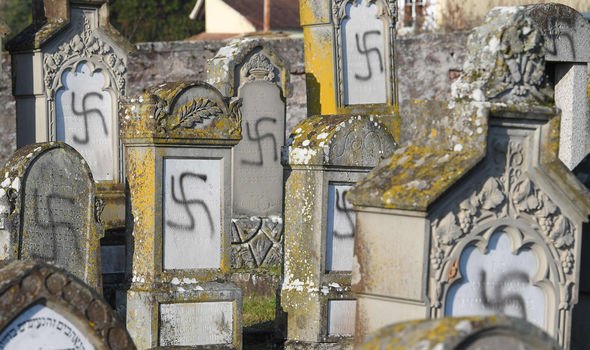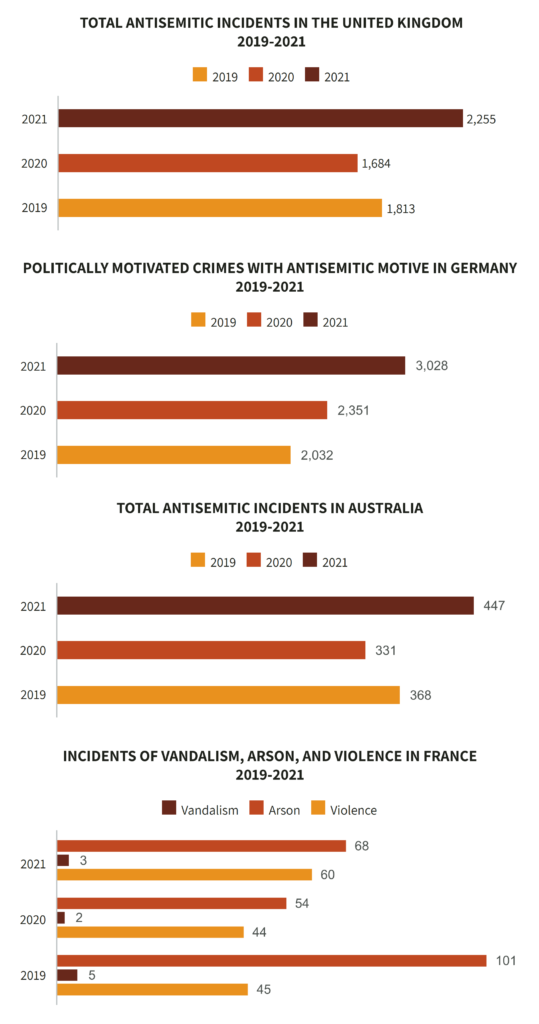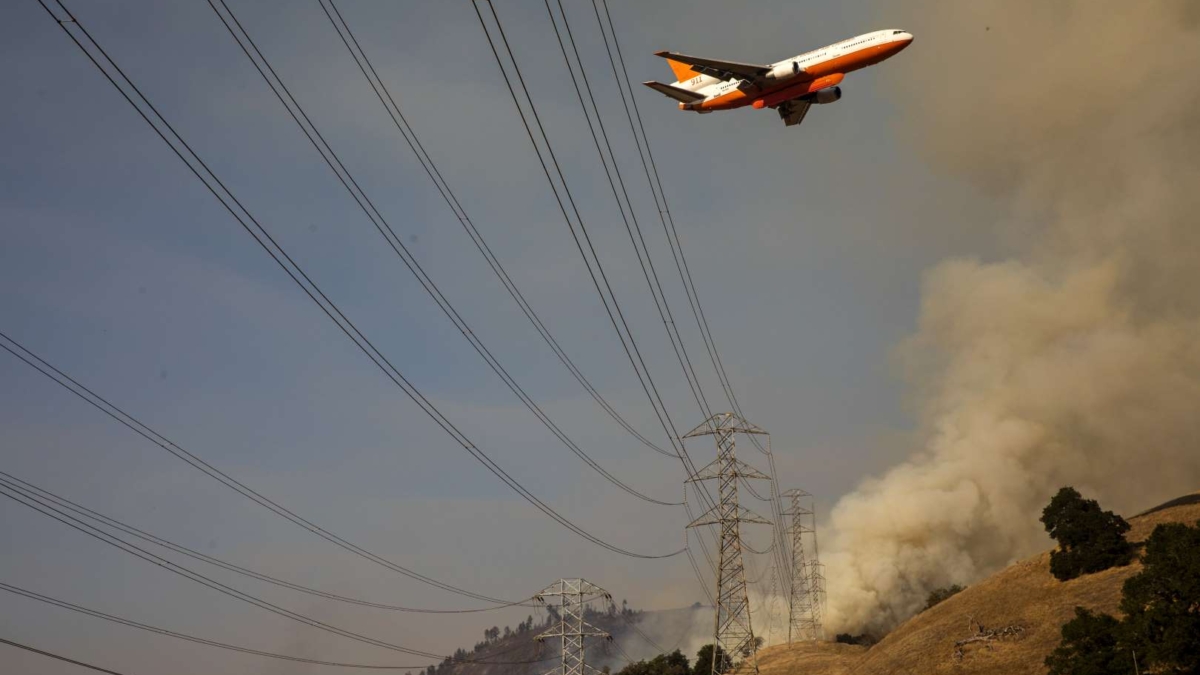Antisemitism rose dramatically in 2021 – “Right at the outset of the pandemic in 2020, conspiracy theories began to sprout around the world, blaming the Jews and Israel for spreading the virus”

27 April 2022 (BBC News) – The number of anti-Semitic incidents around the world dramatically increased last year, a study by Tel Aviv University has found.
The report identifies the US, Canada, the UK, Germany, and Australia as among countries where there was a sharp rise.
This was fuelled by radical left- and right-wing political movements and incitement on social media, it says.
The report’s release coincides with Israel’s Holocaust Remembrance Day, which begins on Wednesday night.
Known in Israel as Yom HaShoah, the day commemorates the six million Jews murdered by Nazi Germany across Europe during World War Two.
The Anti-Semitism Worldwide Report 2021, by the Center for the Study of Contemporary European Jewry at Tel Aviv University’s Faculty of Humanities, is based on the analysis of dozens of studies from around the world, as well as information from law enforcement bodies, media and and Jewish organisations.
It says that in 2021 there was “a significant increase in various types of anti-Semitic incidents in most countries with large Jewish populations”.
It found that:
- In the US, which has the largest Jewish population outside of Israel, the number of anti-Jewish hate crimes recorded in both New York and Los Angeles were almost twice that of the previous year
- In France, the number of recorded anti-Semitic incidents increased by almost 75% compared with 2020
- In Canada, a leading Jewish group reported a 40-year record in anti-Semitic physical violence in one month – August
- In the UK, the number of recorded physical assaults against Jews increased by 78% compared with 2020
- In Germany, anti-Semitic incidents recorded by police were up 29% compared with 2020, and 49% compared with 2019
- Australia also experienced a sharp rise in recorded anti-Semitic incidents, with 88 in May alone – the highest monthly total ever
The report’s authors blame in part reactions to May 2021’s fighting between Israel and Palestinian militants in the Gaza Strip for the rise in anti-Semitic incidents.
That month, Israel and militants fought an 11-day conflict in which 261 people were killed in Gaza, according to the United Nations, and 14 people were killed in Israel.
The report also calls out “the vast reach of social networks for spreading lies and incitement”.
Social media played “an exceptionally alarming role” in anti-Semitic incidents, it says.

“The data raise concerns regarding the utility of legislation and agreements reached with social media companies on banning anti-Semitic expressions from their platforms.”
“The gravest concern is the dark web, which shelters extremists and where anti-Semitic content is freely and openly spread,” it warns, referring to a part of the internet only accessible through special browsing software.
The report also identifies the proliferation of conspiracy theories surrounding the Covid-19 pandemic as fuelling anti-Jewish hate crimes.
“Right at the outset of the pandemic in 2020, conspiracy theories began to sprout around the world, blaming the Jews and Israel for spreading the virus,” it says.
“The lockdowns, which glued people to their screens at home, contributed significantly to popularising toxic anti-Semitic discourse on social networks.
“In 2021, when the lockdowns were gradually eased, anti-Semites returned to the streets.”
Anti-Semitism: Dramatic rise in 2021, Israeli report says
Antisemitism in 2021: War and Covid-19 Catalyzed Global Uptick
25 April 2022 (Tel Aviv University) – Antisemitic incidents dramatically increased over the past year in almost all countries with large Jewish populations, according to the Antisemitism Worldwide Report 2021 published by The Center for the Study of Contemporary European Jewry at Tel Aviv University.
Released annually on the eve of Holocaust Remembrance Day, the report is based on dozens of studies from around the globe, alongside information from law enforcement authorities, media, and Jewish organizations in various countries. It is the 28th-annual report of its kind issued by the Center.
The authors report a dramatic rise in the number of antisemitic incidents in the US, Canada, the UK, Germany, and Australia – as well as other countries. In most countries the increase was particularly notable compared to the pre-pandemic year of 2019.
Key Findings
- 251 antisemitic incidents were recorded in the US, in only three weeks during the riots around the Israel-Hamas conflict in May. According to the annual survey of the American Jewish Committee (AJC), 2.6% of American Jews said they had been the victims of antisemitic physical attacks in the past five years. The Anti-Defamation League (ADL) recorded a 27% increase from 2020 and a 113% increase from 2019 in incidents of white supremacist antisemitic propaganda.
- In France, 589 antisemitic incidents were recorded in 2021, a 74% increase from 2020 and a 14% decrease from 2019.
- In May 2021, B’nai Brith Canada reported 61 assaults against Jews in Canada. Altogether 226 incidents were recorded that month – a 54% increase from the same period in 2020.
- In the UK, 2,255 antisemitic incidents were recorded in 2021, an increase of 34% from 2020. A sharp rise of 78% compared to 2020 was recorded in physical assaults against Jews.
- German Police recorded 3,028 antisemitic incidents during 2021 – an increase of 29% from 2020, and 49% from 2019. Another worrying phenomenon registered in 2021: German anti-vaxxers likened their situation to that of the Jews in the Holocaust. The authors of the Report argue that this has led to trivialization of the Holocaust.
- 447 antisemitic incidents were recorded in Australia in 2021 – an increase of 35% from 2020 and 21.5% from 2019. The highest monthly total ever was recorded in May – 88 incidents.
The authors found similar phenomena in a range of countries: Dr. Inna Shtakser examined the rise of state-sponsored antisemitism under Belarus’ authoritarian leadership; Dr. Carl Yonker and Dr. Lev Topor investigated how antisemitic white supremacists are penetrating mainstream American conservatism; Dr. Ofir Winter analyzed voices in the Arab world that paint the Abraham Accords with unmistakably antisemitic colors; and Adv. Talia Naamat demonstrated the challenges for French courts in prosecuting Islamist antisemitism.
Need to Re-Strategize
“In recent years, the fight against antisemitism has enjoyed extensive resources worldwide, and yet, despite many important programs and initiatives, the number of antisemitic incidents—including violent assaults—is rapidly escalating,” said Prof. Uriya Shavit, Head of the Center for the Study of Contemporary European Jewry at TAU’s Lester and Sally Entin Faculty of Humanities..
Despite certain successes outlined in the Center’s January report on positive trends combating antisemitism, Shavit stressed that the latest findings demonstrate that some strategies are clearly not effective. “The easy thing is to say that more laws and more funding are required,” he said, adding that the situation demands “courageous and unsparing examination” of the efficacy of some of the more prevalent strategies in battling antisemitism.
“The Jewish world must pull itself together and understand that the fight against antisemitism and the fight for liberal democratic values are one and the same,” he concluded.
What Caused the Sharp Increase?
According to the report, the increase stems from the strengthening of both the radical Right and Left political movements in different countries and widespread fake news and incitement on social media networks. Specifically, the number of antisemitic incidents around the world was directly impacted by two major events: The May 2021 conflict between Israel and Hamas (Operation Guardian of the Walls), and the Covid-19 pandemic.
- The 2021 Israel-Hamas Conflict: The authors of the Report note that the operation in Gaza led to a sharp rise in antisemitic incidents around the world, and “exposed an unacceptable reality: when Israel defends itself, Jews across the world are attacked.”
- Covid-19: From the onset of the pandemic in 2020, conspiracy theories began to sprout around the world, blaming Jews and Israel for spreading the virus, reminiscent of centuries-old blood libels. The lockdowns, which glued people to their screens at home, contributed significantly to popularizing harmful antisemitic discourse on social networks. In 2021, when the lockdowns were gradually eased, antisemites returned to the streets, and physical violence against Jews increased.
The report questions the utility of legislation and agreements reached with social media companies on banning antisemitic expressions from their platforms. The gravest concern is the dark web, which shelters extremists of all types, and where antisemitic content is freely and openly spread. The report also notes that Iran invests substantial time and funding in spreading antisemitic propaganda online, focusing their campaigns mainly in the United States and Latin America.
Antisemitism in 2021: War and Covid-19 Catalyzed Global Uptick


